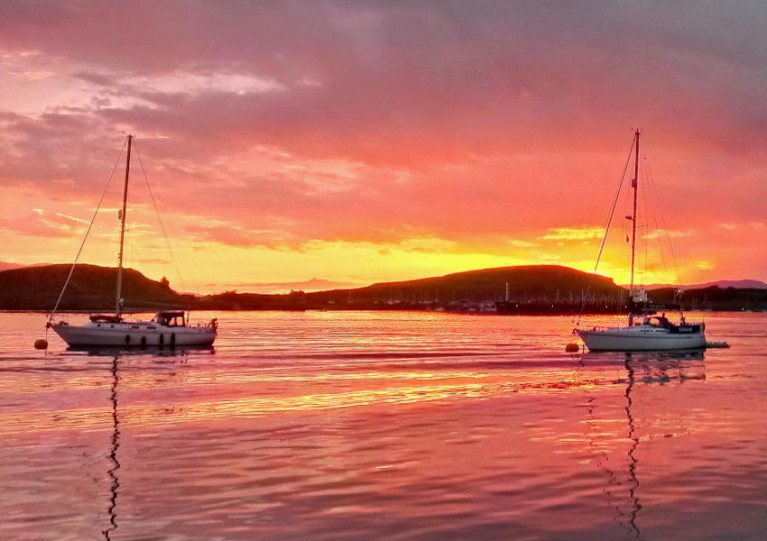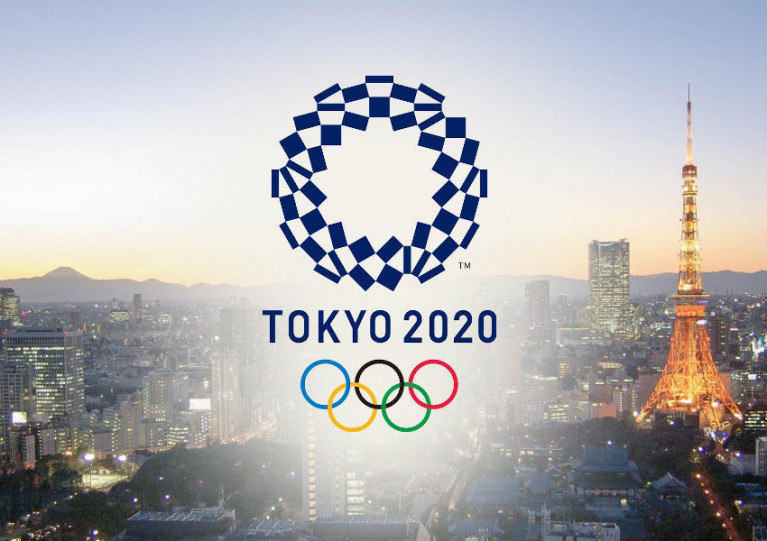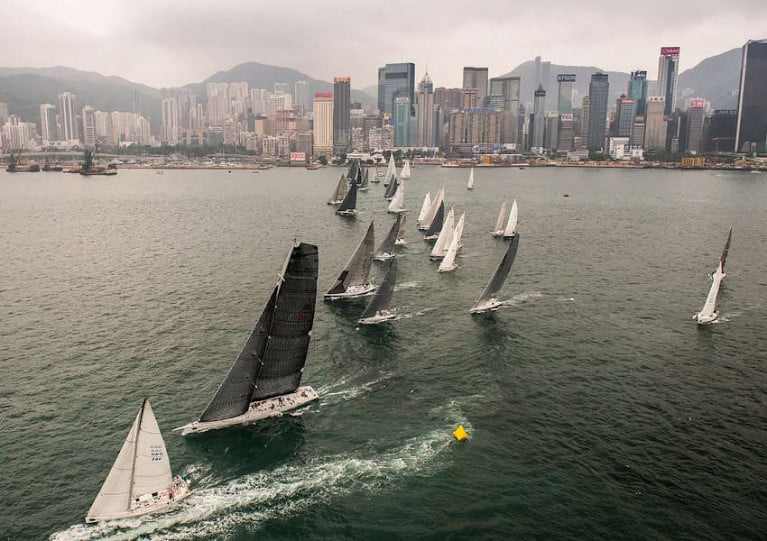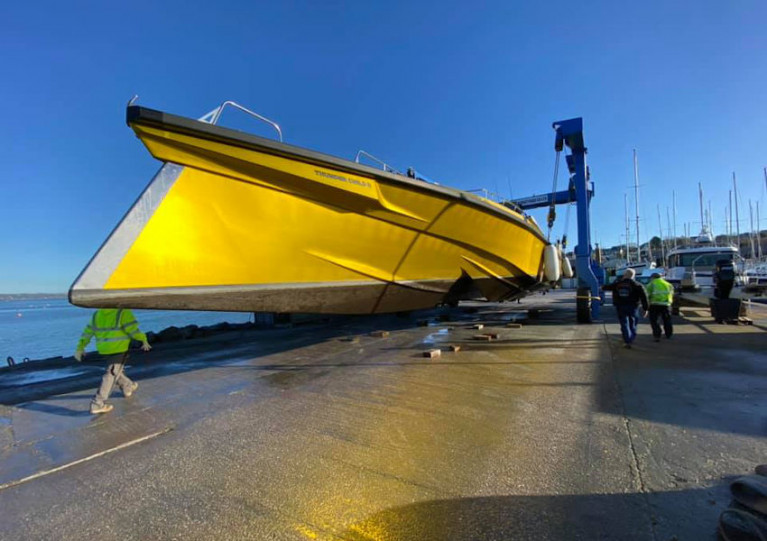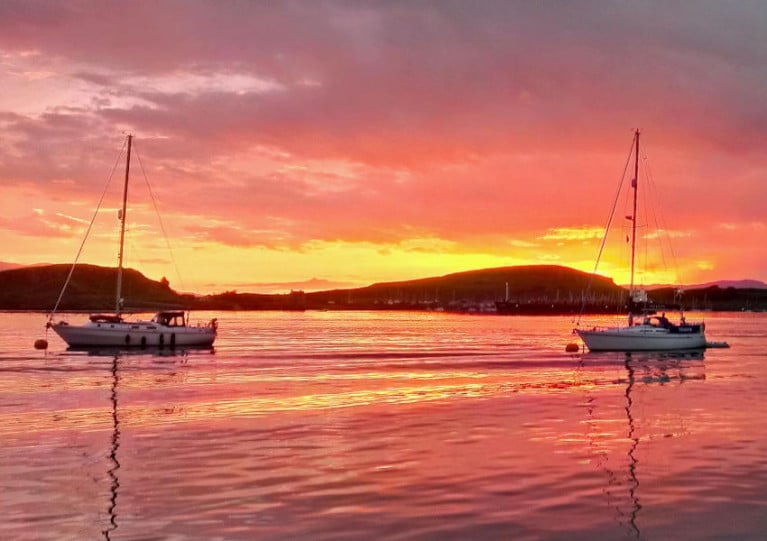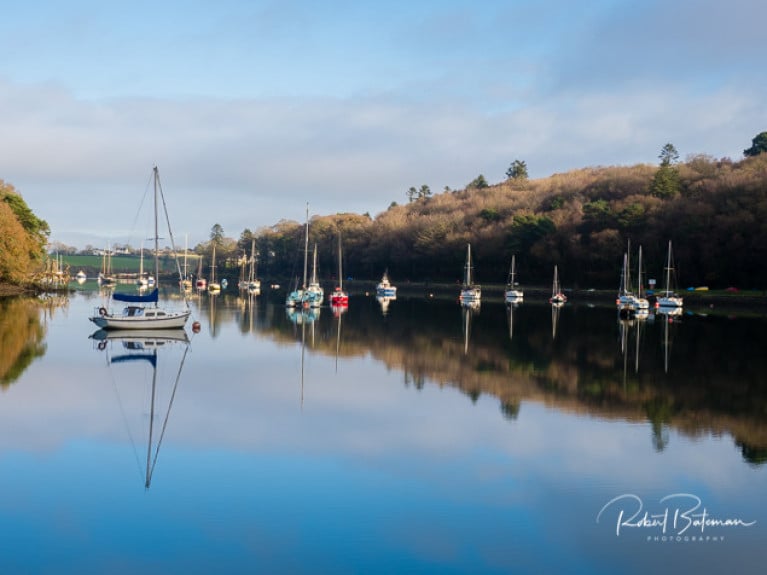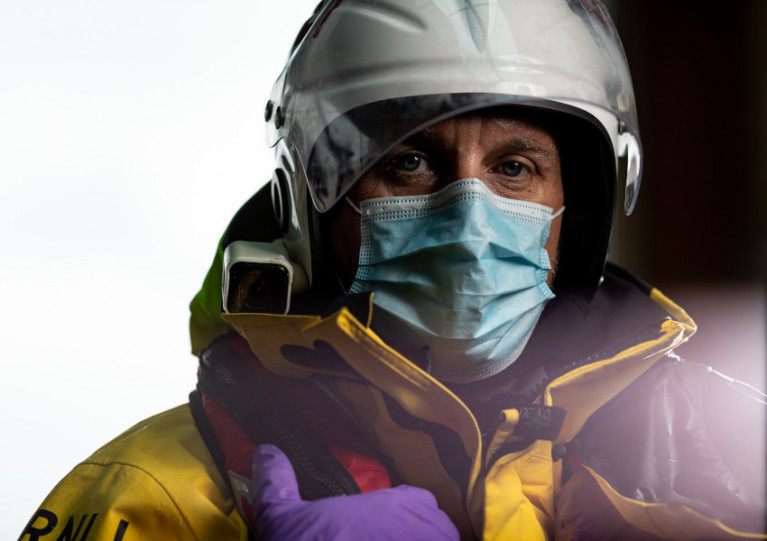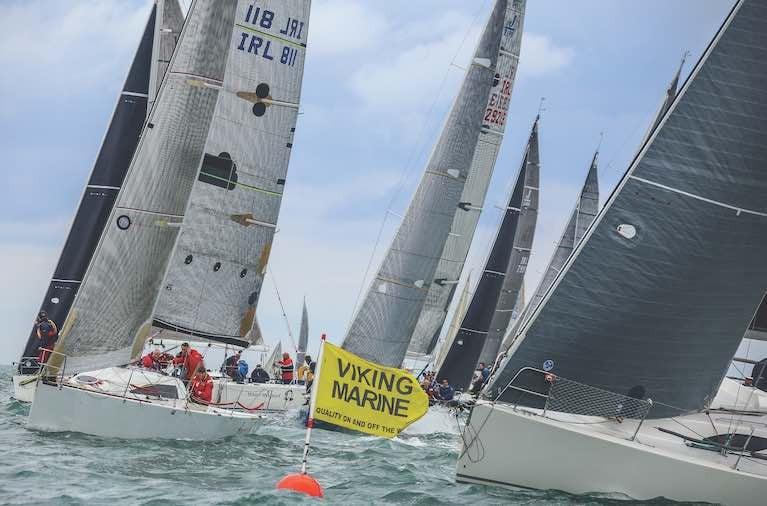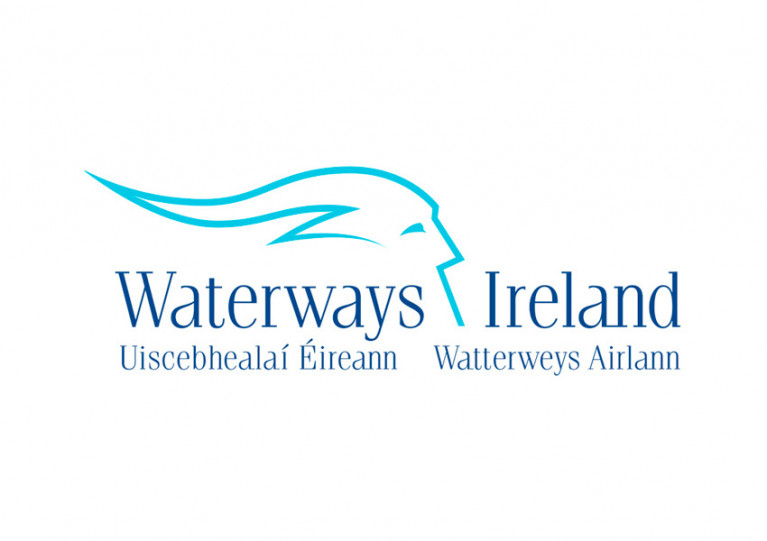Displaying items by tag: Coronavirus
Government's Lockdown Easing Provides Little Clarity for Sailing
Although the summer sailing season draws closer and anticipation builds around a returning to training and competition, there was little concrete for sailing in the cautious government easing of COVID restrictions announced last night.
On Dublin Bay, Ireland's boating capital, the calendar says boats will lift-in at Dun Laoghaire Harbour on April 10th to be followed by the first ISORA Coastal Race on April 17 and for DBSC to start its summer season on April 24.
It's certainly a nice idea and a lot better than staring at the four walls. Or watching Dun Laoghaire pier strollers, cyclists and sea swimmers all currently partaking of the sea air in their droves. With our knowledge of how safe sailing can be from 2020, the view is that organised sailing, training or even racing can't be far behind. Surely?
Sailing is not the enemy at the gate. On the contrary, it is a low risk, non-contact outdoors activity which is what the Government's Sport Expert Group has been told through the Federation of Irish Sport submissions.
Even though we know that there is little difference between sailing in training and racing modes, the sport is reliant on the not so small matter of lockdown measures easing from Level Five to Level Two (when racing is permitted) but, as widely anticipated, this did not materialise in last night's announcement.
It certainly doesn’t look like organised sailing can be underway anytime before April 26 at best and only then if sailing is categorised as a 'distance sport' like golf and tennis that were specifically mentioned by the Taoiseach last night.
Obviously, club administrators will take time to chew over what this easing can mean for Irish sailing but reaction gathered by Afloat after the easing announcement ranged from shoulder-shrugging to a need for more action: "Nothing new as far as I can see", "Not sure", "Could start in May, depends on interpretation", "Sailing needs to be linked to Golf"!
The Government has announced the phased easing of some Covid-19 restrictions during the month of April.
They plan to continue this cautious approach, gradually easing restrictions, while a substantial level of the population are vaccinated during April, May and June, after which, it should be safe to reopen society more widely.
The Government has announced that from April 12 people will be allowed to travel within their county or within 20 km of residence if crossing county borders.
The Taoiseach said from April 19 some additional high-performance training will be allowed, including senior inter-county GAA training to facilitate national league competitions starting in May.
He said training for high performing athletes approved by Sport Ireland will also be allowed.
Mr Martin said from April 26 outdoor sports training for under 18 can begin again.
Some training will be allowed in May but competition will not be permitted initially.
He said golf and outdoor tennis can be played and there will be a return to 'distanced sport'.
But it remains unclear as to how sailing will be categorised in all of this.
2021 Regatta programmes
For regatta organisers who are keen to finalise programmes, there still remains a lack of clarity. Likewise for club leagues which are the backbone of the scene. Ann Kirwan Commodore of DBSC told Afloat, "Despite the lack of clarity in the Government announcement, DBSC is still hopeful that we may begin our season in some form before mid-May".
It is anticipated that bars and restaurants will not open till July, creating a problem for the shoreside segments of any events scheduled prior to that.
Logistics
Certainly in Dun Laoghaire, boat owners boats who live outside five km of the harbour will not be able to return to boats until April 12 under the new restrictions, two days after the scheduled lift in.
Marine industry suppliers are also caught between a rock and hard place. Sailmakers, for example, are currently closed, so sails left in for winter servicing or repair may yet not be back on boats. Will sailmakers for example we be allowed to open and deliver these sails?
Trades and chandlers are providing the regular pre-season service against the odds and battling COVID restrictions and slow delivery of spare parts due to Brexit in a bid to be ready.
Even though we may now have to defer some early racing dates, these are easily moveable and there's a logic in originally setting them. As Peter Ryan of ISORA told Afloat recently, "it's important to put a date down for people to aim for". He's right. Without dates, the risk is the racing calendar will drift and the early season be lost altogether.
Support Scheme for Scottish Marine Tourism Businesses Opens for Applications Next Week
A £2.5m fund to help marine tourism businesses in Scotland restart operations in 2021 will be open for applications from next week, according to Marine Industry News.
The Marine and Outdoor Tourism Restart Fund is part of an overall £104.3m support package for tourism businesses affected by the coronavirus pandemic.
As previously reported on Afloat.ie, the fund is aimed at supporting businesses through the expense of gearing up for the 2021 season.
Both inland and coastal operators will be eligible to apply for grants from £1,000 up to £15,000 in the VisitScotland-administered scheme, which opens at noon on Tuesday 2 February.
“Industry surveys indicated over 75% of operators in the charter and small cruise sector secured two months or less of trading in 2020,” Sail Scotland chief executive Alan Rankin said.
“Managers of local visitor moorings and pontoon services faced a vastly curtailed season, many of whom are not for profit community led groups operating on extremely thin margins.
He added: “The importance of supporting the sector at this time of year is vital, not just for direct jobs but also the valuable economic benefits marine tourism brings to rural and remote coastal and island communities.”
Marine Industry News has more on the story HERE.
Tokyo Olympics Doubtful, Says Man Who Ran London 2012
The head of the organising committee for the London Olympics in 2012 has said the Tokyo Games scheduled for this summer look “unlikely” to go ahead.
As the Guardian reports, Sir Keith Mills told the BBC he “would be making plans for cancellation” if he were in charge of this year’s Olympics, postponed from 2020 over the coronavirus pandemic that has shown little sign of dissipating as a slow vaccine rollout begins.
Japan is currently under a state of emergency prompted by a surge in Covid-19 cases, just six months before thousands of athletes are set to converge for the Olympiad.
A significant number of competitors have yet to qualify for Tokyo 2020, including the likes of Irish Laser sailor Ewan McMahon, Rio rep Finn Lynch as well as Liam Glynn all vying for one fo the last Tokyo berths along with Ireland’s two 49er campaign duos.
Despite the present situation, World Athletics president Sebastian Coe said he was confident the Games will go ahead “but they will look different”.
Last week a spokesperson for the Tokyo organising committee insisted there had been no discussion about a cancellation or extended delay.
The committee’s head Yoshiro Mori said postponing the Games a second time would be “absolutely impossible”.
The Guardian has more on the story HERE.
Rolex China Sea Race 2021 Cancelled Amid Pandemic Concerns
Royal Hong Kong Yacht Club has cited “continued uncertainty regarding international border openings” amid the coronavirus pandemic in its decision to cancel the 2021 Rolex China Sea Race, which had been due to start on 31 March.
In a statement, RHKYC Commodore Denis Martinet, said: “We are of course very disappointed having already postponed this blue ribbon event last year.
“We felt that the situation would have improved sufficiently by March 2021. Yet this is not to be and we feel that it is prudent to cancel.
“The club will nevertheless endeavour to organise an independent race around the same dates in full compliance with any restrictions in place.
“Meanwhile we shall work tirelessly to bring about a fantastic Rolex China Sea Race in 2022 to celebrate its 60th anniversary.”
The club has scheduled next year’s offshore event for 13-27 April 2022, and thanked all registered teams and sponsor Rolex for their support.
The Rolex China Sea Race is among a number of casualties of continued pandemic restrictions in 2021, with the most recent being the RORC Caribbean 600 as previously reported on Afloat.ie.
Crosshaven Boatyard Appeals to Customers for Patience Under Latest Pandemic Restrictions
With the rise in COVID-19 cases and in line with Government guidelines, Crosshaven Boatyard has no option but to close its gates for the time being.
In a statement on social media, the Cork Harbour boatyard appealed for private boat owners to have patience under the current restrictions, which will remain in place until at the least the end of January.
Those within the 5km travel radius may visit to check on their vessels, but are asked to come alone and not to carry out any works.
“If for any reason you feel the need to have your boat checked, please contact the office and we can arrange one of our staff to do this on your behalf,” the boatyard said, adding that staff will be at hand for emergency haul-outs.
The boatyard will also still support essential services such as commercial fishing, Department of Defence, science and research, the RNLI and Port of Cork.
The team added: “Finally we would like to thank you all for your continued support and we look forward to seeing you all back in the water boating once again. Stay safe.”
Crosshaven Boatyard recently changed hands, and new owner Pearse Flynn shared details of his plans to make its facilities the backbone of offshore wind farm services.
Scottish Sailing Tourism to Get a Boost from Restart Funding Scheme
Scotland’s struggling aquatic tourism sector is set to be boosted by a £2.5m pandemic support package from the devolved government, as Marine Industry News reports.
Sail Scotland and Wild Scotland have secured the £2.5m restart grant scheme aimed at supporting businesses through the expense of gearing up for the 2021 season.
Both inland and coastal operators will be eligible to apply for grants from £1,000 up to £15,000 in the VisitScotland-administered scheme.
Operators of visitor moorings and pontoons will also be able to access grants of between £1,000 and £7,500 in the scheme, which opens in January.
“After months of pressing the case to the Scottish Government, we are pleased the hardship faced by operators in the marine sector is being recognised,” Sail Scotland chief executive Alan Rankin says.
But he adds that the restart funding is just one of the industry’s ‘three asks’ of the regional government — with the others being “detailed solutions around workable rules” and a “recovery marketing fund”.
Marine Industry News has much more on the story HERE.
Non-Contact 'Organised Training' For Sailing Can Resume in New Level 3 Restrictions
Non-contact organised training and coaching for sailing can resume in pods of 15 when a move to Level 3 COVID Restrictions (modified) take effect from Tuesday 1st December according to a Government announcement.
The main points of these restrictions as they impact on sailing activity are:
- Non-contact organised training & coaching can resume in pods of 15. This allows for mixed household crew for double handers and keelboats with crew sailing in pods.
- Professional and Elite sailing continues
- Instructor Training can resume
With respect to Travel restrictions, county restrictions apply to all with the exception for work, education, medical and other essential purposes.
Demand on RNLI Lifeboat Crews Soared as Summer Lockdowns Eased in UK & Ireland, New Data Shows
The RNLI says its volunteer crews faced an “unprecedented” summer as statistics reveal a big increase in callouts to people in distress compared to the same time last year.
Based on provisional incident reports from lifeboat stations around the UK and Ireland, the RNLI says there was a 64% jump in the number of recreational water users its crews aided.
RNLI lifeguards around the UK also reported an increase in the number of visitors to beaches around the coast as coronavirus lockdown measures eased between June and August.
The newly released figures cover people who got into difficulty while bodyboarding, using inflatables, kayaking, or canoeing, kitesurfing, paddle boarding, rowing, surfing, swimming, waterskiing, windsurfing and dinghy sailing.
This summer, 177 water users were aided while kayaking or canoeing, an increase of 84 people in comparison to 2019.
The number of people who needed help from RNLI lifeboat crews after getting into difficulties on inflatables more than doubled, the charity adds.
Stand-up paddle boarding, and increasingly popular sport, saw a 40% rise in lifeboat launches and the number of casualties assisted almost tripled.
Lifeboat crew callouts to swimmers were up by 14%. And launches to people who got into trouble while walking or running at the coast over the summer increased by 46%, with 175 more people aided in comparison to last year.
The RNLI’s head of water safety, Gareth Morrison, said: “Our volunteer crews have been on call throughout the pandemic. This year, they faced a summer like no other.
“When lockdown restrictions eased, we saw people flock to the beaches to enjoy our coastlines instead of holidaying abroad. But that resulted in a huge number of people getting into difficulty around our coasts, with our lifesavers facing an incredibly busy summer.
“If you find yourself in trouble at the coast this winter, call 999 and ask for the coastguard.”
The RNLI has spent £1.2 million (€1.34 million) this year on PPE to keep its lifesavers and the public safe during the coronavirus crisis, including almost 700,000 face masks, 2.4 million gloves and 4,700 litres of hand sanitiser.
Additionally, RNLI shops were closed, and fundraising events were cancelled, costing the charity that saves lives at sea potentially millions in lost income.
The RNLI relies on the support of the public to continue saving lives, and that support is needed now more than ever. To support its Christmas Appeal visit RNLI.org/Xmas
How Will COVID-19 Affect Yacht Racing in 2021?
Four-time Olympic keelboat helmsman Mark Mansfield, a regular competitor at Irish IRC and one-design regattas and Irish agent for some well-known sailing brands, reviews how the 2020 sailing season 'happened' in pandemic and considers what could be done to keep the scene alive in 2021
2020 will likely go down as one of the strangest ever yacht racing seasons. It started back in January with great optimism, looking forward to such events as the Round Ireland Race, The 300th Anniversary Cork Week Regatta, Bangor Regatta on Belfast Lough and Wave Regatta in Howth. In the end, though some regattas were rescheduled for later in the year, all foundered with the ups and downs of the dreaded Covid-19 pandemic.
In the few months from May to August, some reasonable racing was allowed to be had at club level around the country, including a decent number of DBSC races on Dublin Bay and a revamped ISORA series from Dun Laoghaire Harbour.
 Article author Mark Mansfield suggests reduced crew numbers and an emphasis on coastal course racing can help to keep cruiser-racer going in 2021
Article author Mark Mansfield suggests reduced crew numbers and an emphasis on coastal course racing can help to keep cruiser-racer going in 2021
One of the highlights was a pop up offshore fixture, the inaugural 260-mile Fastnet 450 Race, which involved a race from Dun Laoghaire on the East Coast around the Fastnet Rock on the South Coast and into Cork Harbour, all held under strict no contact Covid regulations with an online briefing and prizegiving.
 The winner of the Fastnet 450 Race was Royal Cork yacht Nieulargo (Denis and Annamarie Murphy Photo: Afloat
The winner of the Fastnet 450 Race was Royal Cork yacht Nieulargo (Denis and Annamarie Murphy Photo: Afloat
Clearly, the lessons learned in 2020 will need to be brought into 2021 to see what was successful, and what was not.
Going forward, large onshore events which involve a lot of socialising and shoreside entertainments will not likely be a runner again in 2021. So how should we be preparing to ensure 2021 allows decent racing and allows owners to get good use out of their boats? Here are some suggestions and thoughts on this.
Boat crew numbers
When Afloat published my thoughts on the 12th of May about how keelboat racing work can with social distancing, I suggested that reducing cruiser crew numbers while racing would assist in social distancing and project the right image.
This article was picked up by the international sailing media and carried by websites around the world. I got a lot of positive feedback.
 A screenshot of Mark Mansfield's May article in Afloat setting out how keelboat racing can be kept going in pandemic
A screenshot of Mark Mansfield's May article in Afloat setting out how keelboat racing can be kept going in pandemic
In Ireland, Irish Sailing, the national governing body, decided to effectively open up to full crews on yachts, after initially being ultra-cautious and allowing no cruiser-racing apart from same household crews. Then, when Level 3 came in, all racing was closed down again, despite other sports continuing to compete. This course of action and the zig-zag nature of their direction has led to a lot of disquiet and it continues.
In the UK, when they allowed cruiser racing to open up, it initially was with household crews, then when this was extended it was with limited numbers while racing.
80% of a boats IRC crew number rounded to the nearest whole number was the norm with events such as the RORC IRC National Championships and the J Cup, both held under these restrictions.
I appreciate sailing happens in the open air and it has been rare to find anyone being infected with Covid-19 while sailing, however, reducing crew numbers shows the sport is making the effort and the optics are much better. Eight bodies sitting out shoulder to shoulder on a 35-footer does not give the right impression.
 Before COVID - The successful Dublin Bay J109 Joker II going upwind in Kinsale at the 2017 ICRA Nationals – which she won
Before COVID - The successful Dublin Bay J109 Joker II going upwind in Kinsale at the 2017 ICRA Nationals – which she won
With many owners struggling to fill full crew positions on their boats anyway, restricting all boat crew numbers could also help level the playing field. Maybe Irish Sailing and the Clubs it represents could look at this as an option to allow racing to continue next year?
2021 Irish Sailing Calendar
2021 is scheduled to be another big year if Covid allows it. For cruiser-racers around the country, you have, in addition to DBSC, ISORA and other club racing, the following big events.
- Scottish Series, Tarbert, 28th May to 31 May 2021
- Dun Laoghaire Dingle Race, 9th June
- Sovereign's Cup, Kinsale, 23rd to 26th of June
- Bangor Town Regatta, Belfast Lough, 24th to 27th June
- Volvo Dun Laoghaire Regatta, 8th to 11th July
- Calves Week, Schull, 3rd to 6th of August
- ICRA Nationals, National YC, 3rd to 5th of September
Add to this WIORA in Tralee, and perhaps another Fastnet 450 Race and this could be a really great season—if it all goes ahead. So how does sailing position itself to be able to complete these larger regattas in what will likely still be a Summer of Covid restrictions? The answer has to be:
Good PR – Highlighting the Covid restrictions to make everyone safe—no gatherings, no briefings, no in-person prizegivings. Highlight the sailing, not the shore activities.
Reduce crew numbers – see above
Provide more coastal and longer races – rather than the three races a day that is the norm. Shorter races with more turning marks need more crew aboard and all the crew end up coming ashore at the same time. Longer Coastal races need fewer people and the boats come back home on a staggered basis.
Prepare a strong 'Plan B' – for having no onshore events or contact. July's Dun Laoghaire Regatta with four clubs to dissipate people, an on-site marina and a large town just behind, are already anticipating this by separating the event into one designs one weekend and IRC racing the next.
More offshore racing
Offshore and long coastal racing needs to be included more in boat owners plans if they are to get value from their investment. As the Fastnet 450 Race showed, there is an increasing appetite for this form of the sport, and in these Covid times, that interest has grown further. Offshore racing, with limits on crew numbers, allows for relatively safe sailing with crews being able to stay apart easier and boats arriving back to port looking for rest rather than social interaction.
 ISORA managed to run eight coastal races off Dun Laoghaire Harbour this season keeping the Irish Sea offshore scene very much alive despite the pandemic Photo: Afloat
ISORA managed to run eight coastal races off Dun Laoghaire Harbour this season keeping the Irish Sea offshore scene very much alive despite the pandemic Photo: Afloat
ISORA can be congratulated for growing this form of the sport in Ireland and Wales and even in this difficult year, they were able to get in a range of races, all be it without being able to mix the Irish and welsh boats. The combination of shortish offshore races and long coastal racing has been very popular in 2020 and I expect you will see a few more boats join their ranks in 2021.
On the South Coast, there is a move afoot to come up with a similar series to link the Fastnet 450 race with the Kinsale/Fastnet/Kinsale race and then add some coastal day races to form a series. More to follow on this.
 ISORA Champion Rockabill VI (Paul O'Higgins) from the Royal Irish Yacht Club
ISORA Champion Rockabill VI (Paul O'Higgins) from the Royal Irish Yacht Club
Fingers crossed a vaccine or better treatments for Covid will come quickly, but it is doubtful that they will come quickly enough to mean our 2021 season will be back to normal. We have to expect that 2021 will be disrupted again, and now it the time to plan for this. With some small changes, a bit of luck and a bit of goodwill all or most of these big events above can happen and be a great success. Let's plan for the worst but hope for the best.
Mark Mansfield is an Irish agent for Quantum Sails and J Boats/Grand Soleil in Ireland. More details below.
Waterways Ireland Shuts Service Blocks, Locks & Bridges Amid Nationwide Level 5 Restrictions
Waterways Ireland has temporarily closed service blocks across its all-island network of inland waters as of today, Thursday 22 October.
The move is in line with the latest coronavirus control measures announced by both the Northern Ireland Executive and the Irish Government.
Pump-out facilities remain available for use but owners must ensure that travel to these facilities is done in a responsible manner, minimising the amount of essential movement out on the water.
In the Republic of Ireland, all service blocks, locks and bridges are closed for at least the next six weeks.
Waterways users on both sides of the border are advised that no unnecessary travel should be undertaken at this time.
Boaters in the Republic of Ireland are additionally reminded that essential travel and exercise is only permitted up to 5km from home.
Travel further than 5km to check on vessels moored on the navigation is expressly prohibited until further notice.
The five-day mooring rule suspension on the Shannon Navigation and Shannon-Erne Waterway has been extended to 31 October with no additional cost.
Towpath users are also reminded of the need to observe social distancing and other Level 5 restrictions.
Waterways Ireland’s message to all waterways users continues to be ‘please stay at home’.



























